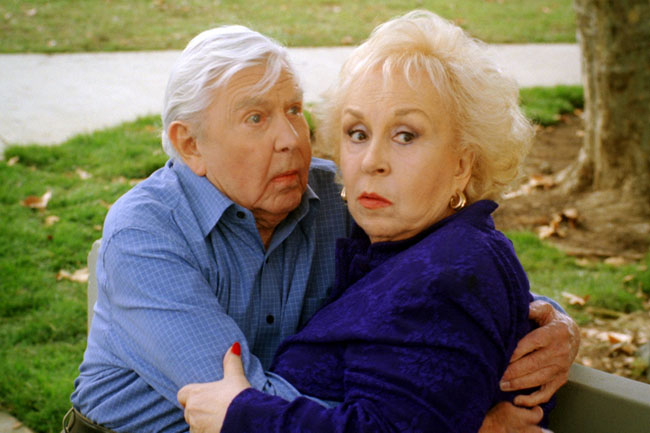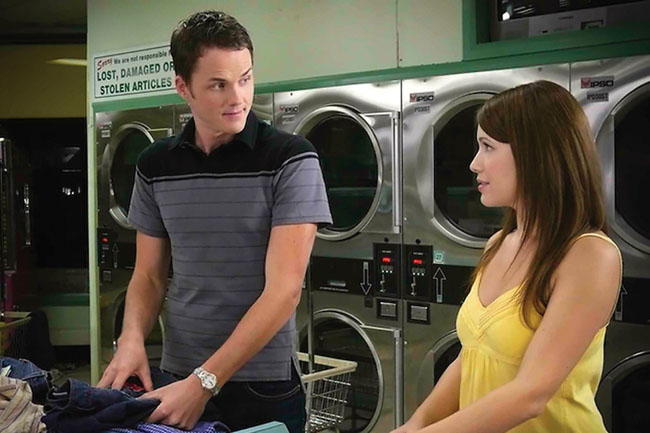CHICAGO – In anticipation of the scariest week of the year, HollywoodChicago.com launches its 2024 Movie Gifts series, which will suggest DVDs and collections for holiday giving.
Interview: Director Marc Fienberg on How to ‘Play the Game’ With Andy Griffith
CHICAGO – When Marc Fienberg, first time director/writer of ‘Play the Game,’ was casting the role inspired by his grandfather, little did he know he soon would be working with the film and TV legend Andy Griffith.
 Rating: 2.0/5.0 |
Griffith joined other sitcom stalwarts – including Doris Roberts of “Everyone Loves Raymond” and Liz Sheridan, best known as Jerry’s mother on “Seinfeld” – in a contemporary romantic comedy.
David (Paul Campbell) is a hotshot car salesman. When it comes to women, he is a player that uses the “game” to score easy relationships. In encouraging his widowed grandfather (Griffith) to use similar techniques, he sets off a series of events that have them both learning lessons about love and connection.
 Photo credit: Story Films |
HollywoodChicago.com recently had a chance to interview writer/director Marc Fienberg in regard to his film debut. He talked about working with the sitcom giants, his grandfather’s Chicago roots and staying prepared as a first-time director.
HollywoodChicago.com: What were the advantages and disadvantages of having your directorial debut with your own screenplay, did you chart the course directly from the beginning or did you allow some flexibility while you were on set?
Marc Fienberg: You always allow flexibility on the set, but because there was such a long gestation period for the script, we had it in a good spot, in terms of where we wanted to end up. The actors did some great improvisation, there was time to do that, and some of it ended up in the film.
I did storyboard the entire movie, that was one of things that gave me security as a director.
HC: What was the set like with all the veterans of sitcom history – Andy Griffith, Liz Sheridan, Doris Roberts – in your midst? Were you able to discuss characterization with them or did you just let them do their own thing with it?
MF: A little bit of both. First off, just being on the set with them as a first time director was fantastic, amazing and a little nerve racking.
In terms of directing them, I learned very quickly an important lesson. They say that 90% of directing is casting, and I found that to be true. When you have legends like that with so much experience, the best thing I could do was yell ‘action’ and get out of the way. When I did that, great things happened, and when I didn’t do that, those were the scenes that ended up on the cutting room floor.
A quick story about Andy Griffith. I told him how to walk into a particular scene. He gave me a look that said, ‘I’ve been doing this longer that you’ve been alive’ (laughs). But he was a huge sport about it and very patient with me.
HC: I noted that the relationship between Paul Campbell and Andy Griffith was fairly relaxed. How did the two actors approach the relationship, given the legendary status of Mr. Griffith?
MF: It got off to a nerve-racking start. They didn’t get to meet until we went right into a table read [pre-production]. Andy comes from a time when doing the table read was all out and really acting. Whereas Paul was just doing a walk-through, as he had learned. Andy whispered to me that he thought the young gentleman was ‘reading too fast’ and Paul heard him.
But when we started rehearsing the next day, and actually pushing the scenes, Andy called Paul’s agent to compliment him as an actor. From that day forward, it felt like a grandfather/grandson relationship. It was a huge mutual respect between the two, and they really loved working together.
 Photo credit: Story Films |
HC: What have you observed about modern relationships that inspired this screenplay? Are you implying that true love is possible or that the “game” means we’re all just tilting at windmills?
MF: Part of the challenge of making a great romantic comedy is having the happy ending, where the people you want to be together end up together, but also to surprise the audience.
Luckily we had an ending that satisfied people and yet still surprised them in a way they didn’t expect to be surprised. The goal for me was to come up with an ending that reflected a more realistic theme of the overall movie…is it necessary to ‘play games’ or is it better to just be completely honest?
HC: Was the cast bringing in some of their own relationship situations into the filmmaking process? How did they relate that into your screenplay?
MF: Not overtly. Based on the pre-production interviews, I suspect they did bring in their own relationship stories and ways of dealing with that into their characters.
But I think it’s more the reverse, where they really channeled the character through them, meaning they took the character as written and brought something new to it. For example, Andy Griffith took the character of my actual grandfather, as I wrote it, and brings something to it that even I didn’t see – and it’s my own grandfather.
HC: Who were the inspirations for the senior citizen characters in the film and what did you observe about them in steering the screenplay towards the subject matter it expressed about old age?
MF: It was really just my grandfather and his friends living every day as if it were their last, and at that age it could be. The more time I spent with them, the more special that philosophy became. And that was the DNA of the movie. Plus no matter how old you are, you need social interaction, companionship and love.
Photo credit: Patrick McDonald for HollywoodChicago.com |
HC: What did you observe about the friendship of Andy Griffith with Rance and Clint Howard, in terms of its length and professional interaction?
MF: It was great because it was kind of a reunion for them. Clint was on the old Andy Griffith Show for five or six episodes. Rance and Andy go way back. So it was nice coming together that was completely unplanned before hiring everyone. Clint was the first one on, but I sent the script to Andy completely separate. Clint did put in a good word for us, which didn’t hurt.
Clint also suggested his father Rance, and I immediately made the call. We got lucky when Rance agreed to join the cast, and it became a reunion for them.
HC: I noted a number of Chicago references in the narrative, despite being filmed in Los Angeles. Did you consider filming it here or was the budget or film parameters not suited for actual location?
MF: The plan was to shoot in Chicago. What happened was, because it was an independent film, that we had to roll with where we ended up. It was much easier to do it in Los Angeles than in Chicago. But I couldn’t bear to cut the Chicago references. If you ignore the palm trees and the mountains, you can envision Chicago (laughs).
HC: As a young filmmaker, which classic directors are your inspiration and what contemporary directors serve as a template for the type of work you are doing?
MF: I studied business in college, not film, so I don’t necessarily follow the older directors, I’m ashamed to say.
But as for contemporary directors, Rob Reiner, Frank Darabont and Ron Howard come to mind. It occurred to me later that the reason I was thinking about casting Clint Howard is because I see him in every Ron Howard film. And the common thread with all of those directors is that they focus on story.
HC: What is the atmosphere right now in contemporary Los Angeles for filmmakers and actors? Is the economic downturn making that lifestyle more difficult?
MF: I’m sure it’s has made it more difficult, but I don’t think tangibly so, and here’s why – because it is so difficult to begin with, and that it couldn’t be more difficult, at least from a writing and directing standpoint. It’s such an uphill battle even in good times, in bad times it’s probably only a little bit tougher. I don’t think people feel any more pressure or difficulty than they already feel.
 | By PATRICK McDONALD |


